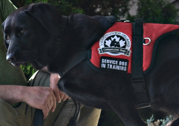
If it wasn’t for Trooper, a little rescue dog turned compassion dog, and an amazing woman named Barb Ashmead, war veteran Brian Cameron might still be terrified to even walk out his front door. As it was, Barb and Brian and Trooper inspired and educated all of us who attended the January PROBUS meeting about post traumatic stress disorder (PTSD) and how it is being tackled right here on VanIsle….
From the buzz in the room and the size of the crowd, it was evident that NW Bay PROBUS members were happy to be back to January meetings.
Our speaker, Barb Ashmead from Vancouver Island Compassion Dogs, was certainly a draw, educating us about the comprehensive 52-week program whose mission is to help Canadian veterans cope with post traumatic stress disorder (PTSD) by providing them with a trained “compassion dog”. Along with a good deal of counselling, these veterans and their dogs work together to allow that veteran to be able to function again in society. Barb, who owns a pet store in Qualicum Beach, has been the driving force who pioneered this organization almost four years ago turning it into the success it is today.
However, as you might expect, a polite little retriever dog named Trooper, stole the show along with her owner, veteran Brian Cameron, who told us about his experience with PTSD after serving in Sarajevo during the brutal years of 1993/94. Sent over there on what he thought was to be a “peacekeeping mission” (ostensibly in charge of food conveyance) it wasn’t long before he was in the thick of the war, dodging bullets and facing combat. This experience left him suffering with PTSD so severe that he was unable to leave his home without everyday events, normal to everyone else, causing him to be terrified.
It was at a meeting for such veterans that Trooper, a rescue dog now trained as a compassion dog, went up to Brian and “chose” him to be her owner. After that they spent 52 weeks training together. Some of the things Trooper does for Brian are:
- Protect his “space” when they are out in public so he doesn’t have panic attacks from strangers getting too close.
- Make sure he takes his medications by setting them on his lap.
- Accompanies him everywhere so he is now able to fly, go out on his boat fishing and crabbing, and go to shopping malls.
- Speak in public to educate about the role of compassion dogs and PTSD.
What is PTSD? Brian explained it as “an injury that is invisible”. A normal occurrence, like a plate falling to the floor, would make most of us sit up and notice, but with PTSD the reaction is severe. The brain can’t distinguish, sends out a shot of adrenaline and the body goes into “fight or flight” mode. This can cause panic, nightmares, depression, withdrawal or even confrontational or suicidal tendencies. There is no cure for PTSD but it can be helped. As Brian concluded: “Every vet has a different story…but it’s the same story”
At present, none of this program is government funded. Here’s how you can help:
- Donate to the program
- Hold a fundraiser (Some of us are already planning a garage sale for them in April!)
- Foster a potential compassion dog for three months. (All expenses: food, vet bills, etc. are paid for)
For more information, go to the website: www.vicompassiondogs.ca
Article by Steph Smith



This warms my heart. I am a wheelchair user and I have had a service dog who helps me throughout the day for years. Our son is severely autistic so we decided to get him a therapy dog. Seeing how he helps him calm down after a meltdown is beautiful. I really hope this program is able to help many people who have PTSD.